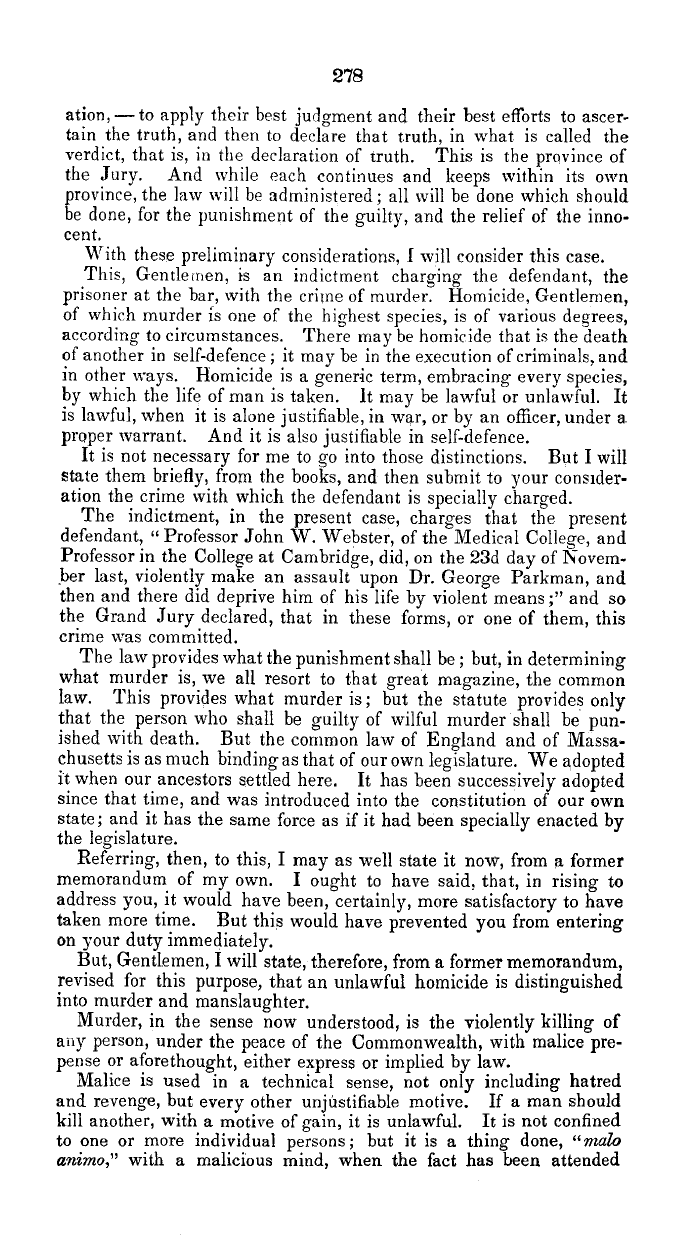|
278
ation,-to apply their best judgment and their best efforts to ascer-
tain the truth, and then to declare that truth, in what is called the
verdict, that is, in the declaration of truth. This is the province of
the Jury. And while each continues and keeps within its own
province, the law will be administered; all will be done which should
be done, for the punishment of the guilty, and the relief of the inno-
cent.
With these preliminary considerations, I will consider this case.
This, Gentlemen, is an indictment charging the defendant, the
prisoner at the bar, with the crime of murder. Homicide, Gentlemen,
of which murder is one of the highest species, is of various degrees,
according to circumstances. There may be homicide that is the death
of another in self-defence ; it may be in the execution of criminals, and
in other ways. Homicide is a generic term, embracing every species,
by which the life of man is taken. It may be lawful or unlawful. It
is lawful, when it is alone justifiable, in war, or by an officer, under a.
proper warrant. And it is also justifiable in self-defence.
It is not necessary for me to go into those distinctions. But I will
state them briefly, from the books, and then submit to your consider-
ation the crime with which the defendant is specially charged.
The indictment, in the present case, charges that the present
defendant, °° Professor John W. Webster, of the Medical College, and
Professor in the College at Cambridge, did, on the 23d day of Novem-
ber last, violently make an assault upon Dr. George Parkman, and
then and there did deprive him of his life by violent means;" and so
the Grand Jury declared, that in these forms, or one of them, this
crime was committed.
The law provides what the punishment shall be; but, in determining
what murder is, we all resort to that great magazine, the common
law. This provides what murder is; but the statute provides only
that the person who shall be guilty of wilful murder shall be pun-
ished with death. But the common law of England and of Massa-
chusetts is as much binding as that of our own legislature. We adopted
it when our ancestors settled here. It has been successively adopted
since that time, and was introduced into the constitution of our own
state; and it has the same force as if it had been specially enacted by
the legislature.
Referring, then, to this, I may as well state it now, from a former
memorandum of my own. I ought to have said, that, in rising to
address you, it would have been, certainly, more satisfactory to have
taken more time. But this would have prevented you from entering
on your duty immediately.
But, Gentlemen, I will state, therefore, from a former memorandum,
revised for this purpose, that an unlawful homicide is distinguished
into murder and manslaughter.
Murder, in the sense now understood, is the violently killing of
any person, under the peace of the Commonwealth, with malice pre-
pense or aforethought, either express or implied by law.
Malice is used in a technical sense, not only including hatred
and revenge, but, every other unjustifiable motive. If a man should
kill another, with a motive of gain, it is unlawful. It is not confined
to one or more individual persons; but it is a thing done, "malo
animo," with a malicious mind, when the fact has been attended
|

